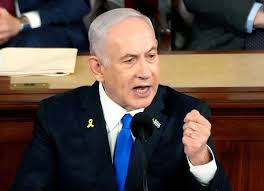Foreign Embassy staffer put up ‘Wanted’ posters of Israel PM Benjamin Netanyahu: Delhi Police informs MHA

In an unusual diplomatic event that has captured public attention, a staff member of a foreign embassy in New Delhi put up ‘Wanted’ posters of Israel’s Prime Minister Benjamin Netanyahu in the city’s diplomatic enclave. The Delhi Police have since reported the incident to the Ministry of Home Affairs (MHA), marking the beginning of sensitive diplomatic discussions between the government and the concerned embassy.
Discovery of the Posters
On the morning of May 29, 2025, several ‘Wanted’ posters featuring Israeli Prime Minister Benjamin Netanyahu appeared in the Chanakyapuri area of New Delhi. These posters, which showed Netanyahu’s photograph under the word “Wanted,” were stuck on public poles in the heart of the diplomatic zone, which is home to many foreign embassies, including those of the United States and Belgium.
The posters immediately raised alarm among local residents and security officials. The diplomatic enclave is normally a highly secured zone, making the appearance of such politically charged material all the more surprising. Authorities viewed the act as a serious breach of diplomatic decorum and began an investigation right away.
Police Investigation and Identification of the Suspect
Delhi Police acted promptly. They reviewed footage from nearly 50 CCTV cameras covering the diplomatic area to identify the person behind the posters. The video revealed a man dressed in a blue shirt and black trousers, riding a bicycle early in the morning. He was seen stopping near an electricity pole and pasting one of the ‘Wanted’ posters.
Further inquiry led police to a residence on Sardar Patel Marg, a well-known diplomatic neighborhood. The man was identified as an employee of the Belgian Embassy in New Delhi. Given the nature of the case and diplomatic immunity granted to embassy staff, police did not detain the individual. Instead, they forwarded the case to the Ministry of Home Affairs for further action.
Diplomatic Repercussions
The incident quickly escalated into a diplomatic matter. Posting ‘Wanted’ posters of a sitting Prime Minister is a rare and sensitive issue, especially when the act involves foreign diplomatic personnel. It carries the risk of straining bilateral relations.
The Delhi Police’s decision to inform the MHA reflects the gravity of the incident. The MHA, in turn, will consult with the Ministry of External Affairs (MEA). Together, these ministries will engage with the Belgian Embassy and possibly other foreign missions to resolve the issue through diplomatic channels.
Embassy’s Response and Public Sentiment
So far, the Belgian Embassy has remained silent on the matter. Sources suggest the embassy has launched an internal inquiry to understand the staffer’s motives. Diplomats often prefer to handle such situations discreetly to avoid public controversy and diplomatic fallout.
The incident has stirred mixed reactions among the public. Some interpret the act as a political protest against Netanyahu’s policies, particularly related to the Israeli-Palestinian conflict. Others condemn the staffer’s actions as a violation of diplomatic protocol that could harm India’s relations with foreign governments.
Background: Netanyahu’s Controversial Position
Benjamin Netanyahu is a polarizing figure on the international stage. His leadership has generated strong opinions globally, especially due to his policies concerning the Israeli-Palestinian conflict. Various groups worldwide have protested against him. However, it is highly unusual for a diplomatic staff member to express dissent publicly in this manner in the host country.
This incident stands out because embassy staffers generally follow strict codes of conduct and avoid political demonstrations that might embarrass their missions or complicate diplomatic relations.
Legal and Diplomatic Considerations
International law grants embassy staff diplomatic immunity. This legal protection allows them to perform their duties without fear of arrest or prosecution under the host country’s laws. While immunity protects diplomats, it also creates challenges when they engage in actions that breach local regulations or diplomatic norms.
India strictly adheres to these laws but must also safeguard its sovereignty and diplomatic decorum. The Delhi Police’s approach shows an understanding that any resolution must be diplomatic rather than punitive.
Possible Consequences and Next Steps
The Ministry of External Affairs is expected to summon representatives from the Belgian Embassy to seek clarifications. The government may also send a diplomatic note (demarche) expressing concern. Depending on the embassy’s internal review, the staffer could face administrative or disciplinary actions from their own country.
This case highlights the delicate balance diplomats must maintain between personal beliefs and official responsibilities. While freedom of expression is important, embassy staff are representatives of their governments abroad and must maintain decorum.
Security Implications and Diplomatic Protocol
This incident could prompt embassies in New Delhi to strengthen their internal security protocols. It may also encourage closer monitoring of diplomatic staff to prevent politically sensitive actions.
India’s government values smooth diplomatic relations with all countries, including Israel and Belgium. The swift response to this incident underscores the government’s commitment to protecting these relationships.
Conclusion
The posting of ‘Wanted’ posters of Israel’s Prime Minister by a foreign embassy staffer in New Delhi is an extraordinary diplomatic event. It brings to light the complex interplay between individual actions, diplomatic immunity, and international relations. As India handles the issue through proper diplomatic channels, the incident serves as a reminder of the importance of restraint and protocol in maintaining global diplomatic ties.






